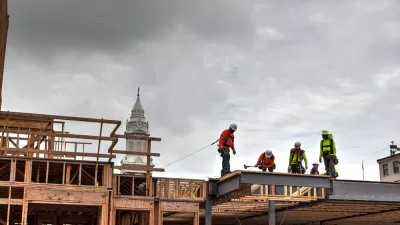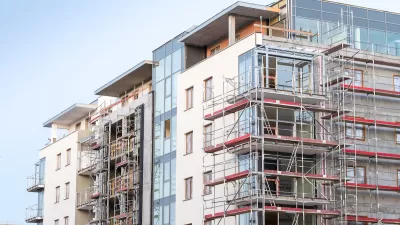Mixed-income housing - infusing affordable housing with market-rate units - is relying more on incentives and subsidies, than mandates, to stimulate development.
Thankfully, dwindling are the days of segregating low-income residents into affordable housing-only enclaves. Today, the need for affordable housing remains, yet an emerging trend is to utilize public incentives to co-mingle income groups in mixed-housing developments.
"The concept is finding favor among for-profit and nonprofit developers alike, particularly in today's tight lending market," states Patricia Kirk of Urban Land Magazine, "because local governments offer a number of incentives, including low-interest financing tools, cash subsidies and grants, free or low-cost land, density bonuses, tax abatement programs, rehabilitation assistance, fast-tracking of plan reviews and permits, and reduced or waived fees." It is these incentives that are driving private developers to include affordable housing in their developments, sometimes mixing affordable units with multi-million dollar ones.
While city planners and some developers state that it's simply "the right thing to do," many cities have been banned from mandating the inclusion of affordable housing into development plans by state statutes. In turn, cities are now looking at the use of incentives to coax developers into voluntarily setting aside up to 20 percent of their units as affordable housing.
For example, "Austin's S.M.A.R.T. (Safe, Mixed-income, Accessible, Reasonably priced, Transit-oriented) Housing Program offers developers a schedule of incentives based on the level of affordable housing provided. The city provides additional density and height variance, or floor/area ratio, to encourage provision of affordable housing and other community benefits, such as parking, open space, and streetscapes." Other cities like Los Angeles, New York and Portland have used similar incentive strategies to construct new transit-oriented developments, senior housing, art colonies and help revitalize economically and environmentally distressed neighborhoods.
FULL STORY: Making Mixed-Income Housing Work

Alabama: Trump Terminates Settlements for Black Communities Harmed By Raw Sewage
Trump deemed the landmark civil rights agreement “illegal DEI and environmental justice policy.”

Study: Maui’s Plan to Convert Vacation Rentals to Long-Term Housing Could Cause Nearly $1 Billion Economic Loss
The plan would reduce visitor accommodation by 25% resulting in 1,900 jobs lost.

Planetizen Federal Action Tracker
A weekly monitor of how Trump’s orders and actions are impacting planners and planning in America.

Waymo Gets Permission to Map SF’s Market Street
If allowed to operate on the traffic-restricted street, Waymo’s autonomous taxis would have a leg up over ride-hailing competitors — and counter the city’s efforts to grow bike and pedestrian on the thoroughfare.

Parklet Symposium Highlights the Success of Shared Spaces
Parklets got a boost during the Covid-19 pandemic, when the concept was translated to outdoor dining programs that offered restaurants a lifeline during the shutdown.

Federal Homelessness Agency Places Entire Staff on Leave
The U.S. Interagency Council on Homelessness is the only federal agency dedicated to preventing and ending homelessness.
Urban Design for Planners 1: Software Tools
This six-course series explores essential urban design concepts using open source software and equips planners with the tools they need to participate fully in the urban design process.
Planning for Universal Design
Learn the tools for implementing Universal Design in planning regulations.
Caltrans
Smith Gee Studio
Institute for Housing and Urban Development Studies (IHS)
City of Grandview
Harvard GSD Executive Education
Toledo-Lucas County Plan Commissions
Salt Lake City
NYU Wagner Graduate School of Public Service





























